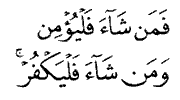Compulsion, Paradise without Reckoning, Time with God
Issue 779 » February 28, 2014 - Rabi al-Thani 28, 1435
Living The Quran
Compulsion
Al-Kahf (The Cave) Chapter 18: Verse 29 (partial)
 "Let whoever wills - believe, and whoever wills - disbelieve."
"Let whoever wills - believe, and whoever wills - disbelieve."
The Quran is affirmative on religious freedom and pluralism. The Quran maintains that faith must be through conviction and that faith which is induced by compulsion is meaningless. Further on religious pluralism, the Quran has, in more than one place, characterized itself as 'an affirmation of the previous revelations and scriptures' that were revealed to other great Prophets preceding Muhammad (peace be upon him).
The Quranic principle of hisbah, that is, promotion of good and prevention of evil (amr bil maruf wa nahi anil munkar), takes for granted the basic freedom of the individual to speak out, to act, or remain silent, in respect of a good cause, or against evil. In a similar vein, the Quranic principle of shura (consultation) in community affairs, and its parallel principle of nasiha (sincere advice), which grants the individual the freedom to advise, even criticize, another person, including a government leader, also proceeds from the affirmative stance that the Quran takes on freedom of expression. The individual is expected to make his own judgement and determine the course of his action and conduct.
Compiled From:
"Shariah Law - An Introduction" - Mohammad Hashim Kamali, pp. 202-204
Understanding The Prophet's Life
Paradise without Reckoning
The son of Abbas, may God be pleased with them both, said: "The Prophet, God bless him and give him peace, came out to us one day and said: 'The communities were paraded before me. There passed before me a Prophet accompanied by one man, a Prophet with whom there were two men, a Prophet who had a small group with him, and a Prophet unaccompanied. Then I saw a multitude so great that it darkened the whole horizon and I hoped that it might be my community. But a voice said: 'This is Moses and his people.' Then I was told to look, and I saw a multitude so great that it darkened the whole horizon. Then I was told to look again, this way and that, and I saw a multitude so great that it darkened the whole horizon. 'These,' I was told, 'are your community, and together with these there are seventy thousand who will enter Paradise without a reckoning.' Then the people dispersed without receiving an explanation from him, so the Companions of the Prophet, God bless him and give him peace, conferred together and said: 'As for us, we were born in polytheism, but we came to believe in God and His Messenger. But these must be our children.' When the Prophet heard of this, he said: 'They are those who do not take omens from birds, do not cauterise themselves and do not steal, but put their trust in their Lord.' [Bukhari, Muslim]
Compiled From:
"Public Duties in Islam" - Ibn Taymiyya, pp. 75, 76
Blindspot!
Time with God
It has been a long-standing tradition of the Muslim world that people have some kind of daily devotions beyond the obligatory rites. Obviously, there has been a decline in this. We have lost our remembrance of God. People are deemed "good" Muslims today only because they perform the daily prayers (which is, of course, necessary). But there was a time when neglecting prayer was nearly impossible. There were strong, positive social pressures to perform the prayers.
In Islam, the morning is a time of sakina (calm and tranquility). Our current culture of "rush" harms our sense of "day" and causes us to miss opportunities of spiritual growth. Speed has become the chief premiums: fast food, fast cars, fast rails, fast jets, fast entertainment, and the like. So much speed, but where is it all leading? People have little time to even stop and ask that question. Haste, it is said, is Satan's work. So take time with God, be with Him, in the morning and evening. No one is suggesting the life of a hermit. But do take time to purify the soul and protect it from the mirages and delusory things of modern living.
Compiled From:
"Purification of the Heart" - Hamza Yusuf, pp. 182, 183